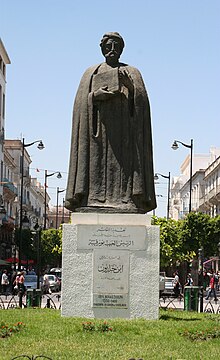ഇബ്നു ഖൽദൂൻ
വടക്കേ ആഫ്രിക്കയിലെ തുനീഷ്യയിൽ[1] ജീവിച്ച ലോകപ്രസിദ്ധനായ ഒരു ബഹുമുഖ പ്രതിഭയാണ്[2][3] ഇബ്നു ഖൽദൂൻ (മേയ് 27, 1332 – മാർച്ച് 19, 1406). അബൂ സൈദ് അബ്ദുറഹ്മാൻ ഇബ്നു മുഹമ്മദ് ഇബ്നു ഖൽദൂൻ അൽ-ഹദ്റമി (അറബിക്:التعريف بابن خلدون ورحلته غربا وشرقا) എന്നാണ് ഇദ്ദേഹത്തിന്റെ മുഴുവൻ പേര്. ചരിത്രകാരൻ,സാമ്പത്തിക ശാസ്ത്രജ്ഞൻ, ഇസ്ലാമിക പണ്ഡിതൻ, ജ്യോതിശാസ്ത്രജ്ഞൻ, നിയമ വിശാരദൻ, ഗണിതശാസ്ത്രജ്ഞൻ, സൈനിക തന്ത്രജ്ഞൻ, സാമുഹിക ശാസ്ത്രജ്ഞൻ,ന്യായാധിപൻ, തത്വജ്ഞാനി, പോഷകാഹാര വിദഗ്ദ്ധൻ, ഹാഫിദ്(ഖുർആൻ മന:പാഠമാക്കിയ വ്യക്തി) എന്നീ നിലകളിൽ അറിയപ്പെട്ട അസാധാരണ പ്രതിഭാശാലിയായിരുന്നു ഇബ്നു ഖൽദൂൻ.
 | |
| കാലഘട്ടം | മദ്ധ്യ കാലഘട്ടം |
|---|---|
| പ്രദേശം | മുസ്ലിം പണ്ഡിതൻ |
| ചിന്താധാര | മാലികി മദ്ഹബ്, ഇസ്ലാമിക സാമ്പത്തിക ശാസ്ത്രം |
| പ്രധാന താത്പര്യങ്ങൾ | സാമൂഹ്യ ശാസ്ത്രം, രേഖീയ ചരിത്രം, സാംസ്കാരിക ചരിത്രം, ചരിത്ര തത്ത്വശാസ്ത്രം, ജനസംഖ്യാ ശാസ്ത്രം, നയതന്ത്രം, സാമ്പത്തികശാസ്ത്രം, ഇസ്ലാമിക പഠനം, സൈനിക തന്ത്രം, തത്വശാസ്ത്രം, രാഷ്ട്ര തന്ത്രം, |
| ശ്രദ്ധേയമായ ആശയങ്ങൾ | Forerunner of demography, historiography, cultural history, philosophy of history, sociology, social sciences, and modern economics. Developed theories of Asabiyyah and the rise and fall of civilizations. |
പല സാമൂഹ്യശാസ്ത്രശാഖകളുടേയും ഉപജ്ഞാതാവായി അദ്ദേഹം പരിഗണിക്കപ്പെടുന്നു. ജനസംഖ്യാ ശാസ്ത്രം[4], സാംസ്കാരിക ചരിത്രം[5], രേഖീയ ചരിത്രം[6][7],ചരിത്ര തത്ത്വജ്ഞാനം[8] എന്നിവ അവയിൽ പ്രധാനമാണ്. ഭാരതീയ തത്ത്വചിന്തകനായ ചാണക്യന് ശേഷം ജീവിച്ച ഇബ്നു ഖൽദൂൻ[9] ആധുനിക ധനതത്വശാസ്ത്രത്തിന്റെ ഉപജ്ഞാതാവായും വിലയിരുത്തപ്പെടുന്നു[7][10][11]. സാമൂഹ്യ ശാസ്ത്രത്തിന്റെ പല ശാഖകളുടേയും പിതാവായി ഗണിക്കപ്പെടുന്ന അദ്ദേഹം[12][13], പാശ്ചാത്യരാജ്യങ്ങളിൽ ഈ ശാഖകൾ സ്ഥാപിക്കപ്പെടുന്നതിന് നൂറ്റാണ്ടുകൾക്ക് മുമ്പ് തന്നെ അവയിലെ പലഘടകങ്ങളെയും മുൻകൂട്ടി കണ്ടിരുന്നു. "കിതാബുൽ ഇബർ" എന്ന മനുഷ്യ ചരിത്രത്തെ കുറിച്ചുള്ള ഗ്രന്ഥത്തിന്റെ ആദ്യ ഖണ്ഡമായ "മുഖദ്ദിമ" എന്ന ഗ്രന്ഥത്തിലൂടെയാണ് ഇബ്നു ഖൽദൂൻ ഏറെ അറിയപ്പെട്ടത്.
അവലംബം
തിരുത്തുക- ↑ Adem, Seifudein (2004). "Decolonizing Modernity Ibn-Khaldun and Modern Historiography" (PDF). International Seminar on Islamic Thought. pp. 570–587 [580–1]. Archived from the original (PDF) on 2008-12-16. Retrieved 2008-09-19.
- ↑ Liat Radcliffe, Newsweek (cf. The Polymath by Bensalem Himmich, The Complete Review).
- ↑ Marvin E. Gettleman and Stuart Schaar (2003), The Middle East and Islamic World Reader, p. 54, Grove Press, ISBN 0-8021-3936-1.
- ↑ H. Mowlana (2001). "Information in the Arab World", Cooperation South Journal 1.
- ↑ Mohamad Abdalla (Summer 2007). "Ibn Khaldun on the Fate of Islamic Science after the 11th Century", Islam & Science 5 (1), p. 61-70.
- ↑ Salahuddin Ahmed (1999). A Dictionary of Muslim Names. C. Hurst & Co. Publishers. ISBN 1-85065-356-9.
- ↑ 7.0 7.1 Enan, Muhammed Abdullah (2007). Ibn Khaldun: His Life and Works. The Other Press. p. v. ISBN 9839541536.
- ↑ Dr. S. W. Akhtar (1997). "The Islamic Concept of Knowledge", Al-Tawhid: A Quarterly Journal of Islamic Thought & Culture 12 (3).
- ↑ L. K. Jha, K. N. Jha (1998). "Chanakya: the pioneer economist of the world", International Journal of Social Economics 25 (2-4), p. 267-282.
- ↑ I. M. Oweiss (1988), "Ibn Khaldun, the Father of Economics", Arab Civilization: Challenges and Responses, New York University Press, ISBN 0-88706-698-4.
- ↑ Jean David C. Boulakia (1971), "Ibn Khaldun: A Fourteenth-Century Economist", The Journal of Political Economy 79 (5): 1105-1118.
- ↑ Smith, Jean Reeder; Smith, J.; Smith, Lacey Baldwin (1980). Essentials of World History. Barron's Educational Series. p. 20. ISBN 0812006372.
- ↑ Akbar Ahmed (2002). "Ibn Khaldun’s Understanding of Civilizations and the Dilemmas of Islam and the West Today", Middle East Journal 56 (1), p. 25.
عبد الرحمن بن محمد بن خلدون الحضرمي
പുറത്തേയ്ക്കുള്ള കണ്ണികൾ
തിരുത്തുകഇംഗ്ലീഷ്
തിരുത്തുക- Ibn Khaldun on In Our Time at the BBC. (listen now)
- Rosenthal, Franz (2008) [1970–80]. "Ibn Khaldūn". Complete Dictionary of Scientific Biography. Encyclopedia.com.
{{cite encyclopedia}}: Invalid|ref=harv(help) - Complete Muqaddimah/Kitab al-Ibar in English (without Chapter V, 13)
- Ibn Khaldun on the Web Archived 2004-06-24 at the Wayback Machine.
- Ibn Khaldun: His Life and Work, by Muhammad Hozien
- Muslim Scientists and Scholars – Ibn Khaldun
- Ibn Khaldūn, from Arnold Toynbee, A Study of History vol. iii, III. C. II. (b), p. 321
- Ibn Khaldun’s Philosophy of Management and Work Archived 2006-10-14 at the Wayback Machine.
- Ibn Khaldun (al-Muqaddimah): Methodology & concepts of economic sociology Archived 2006-08-31 at the Wayback Machine.
- Ibn Khaldun. The Mediterranean in the 14th century: Rise and fall of Empires Archived 2007-09-28 at the Wayback Machine.. Andalusian Legacy exhibition in the Alcazar of Seville
- The Ibn Khaldoun Community Service Award Archived 2012-03-10 at the Wayback Machine.
- Ibn Khaldun meets Al Saud
- The Ibn Khaldun Institute Archived 2012-12-10 at the Wayback Machine.
ബഹുഭാഷാ വെബ് സൈറ്റുകൾ
തിരുത്തുകഇംഗ്ലീഷല്ലാത്തവ
തിരുത്തുക- (in French) Exposé simplifié sur la théologie scolastique
- Chapters from the Muqaddimah and the History of Ibn Khaldun in Arabic
- Dutch biography Archived 2008-03-13 at the Wayback Machine.
- Ismail Küpeli: Ibn Khaldun und das politische System Syriens – Eine Gegenüberstellung[പ്രവർത്തിക്കാത്ത കണ്ണി], München, 2007, ISBN 978-3-638-75458-3 (German e-book about the politics of Syria with reference to the political theory of Ibn Khaldun)